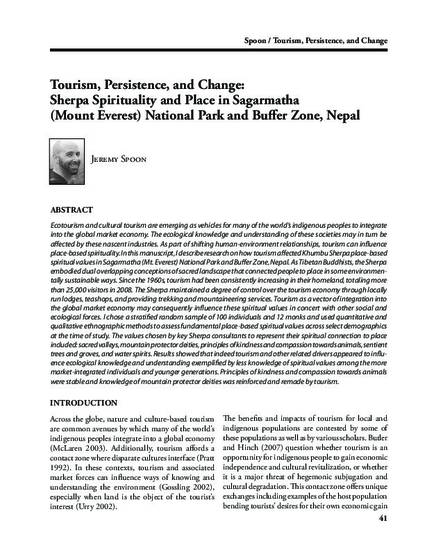
- Everest,
- Mount (China and Nepal),
- Tourism -- Nepal -- Sagarmāthā National Park,
- Tourism -- Himalaya Mountains,
- Mountain ecology -- Himalaya Mountains,
- Sherpa (Nepalese people) -- Religion
Ecotourism and cultural tourism are emerging as vehicles for many of the world’s indigenous peoples to integrate into the global market economy. The ecological knowledge and understanding of these societies may in turn be affected by these nascent industries. As part of shifting human-environment relationships, tourism can influence place-based spirituality. In this manuscript, I describe research on how tourism affected Khumbu Sherpa place-based spiritual values in Sagarmatha (Mt. Everest) National Park and Buffer Zone, Nepal. As Tibetan Buddhists, the Sherpa embodied dual overlapping conceptions of sacred landscape that connected people to place in some environmentally sustainable ways. Since the 1960s, tourism had been consistently increasing in their homeland, totaling more than 25,000 visitors in 2008. The Sherpa maintained a degree of control over the tourism economy through locally run lodges, teashops, and providing trekking and mountaineering services. Tourism as a vector of integration into the global market economy may consequently influence these spiritual values in concert with other social and ecological forces. I chose a stratified random sample of 100 individuals and 12 monks and used quantitative and qualitative ethnographic methods to assess fundamental place-based spiritual values across select demographics at the time of study. The values chosen by key Sherpa consultants to represent their spiritual connection to place included: sacred valleys, mountain protector deities, principles of kindness and compassion towards animals, sentient trees and groves, and water spirits. Results showed that indeed tourism and other related drivers appeared to influence ecological knowledge and understanding exemplified by less knowledge of spiritual values among the more market-integrated individuals and younger generations. Principles of kindness and compassion towards animals were stable and knowledge of mountain protector deities was reinforced and remade by tourism.

This article was funded by a U.S. National Science Foundation Graduate Research Fellowship at the University of Hawaii Manoa.
Originally published in Journal of Ecological Anthropology, University of Southern Florida. Article can be found at http://shell.cas.usf.edu/jea/